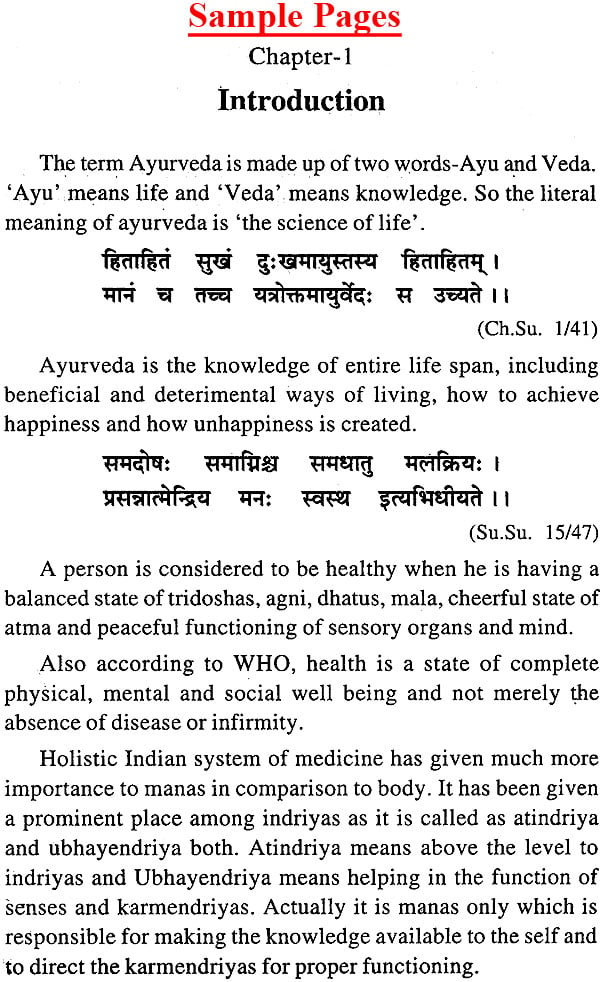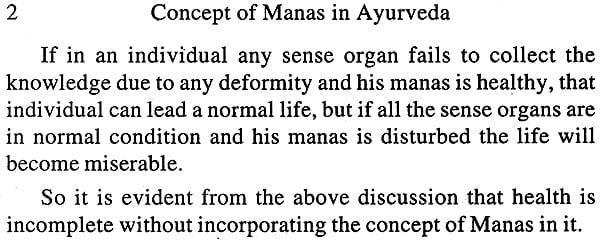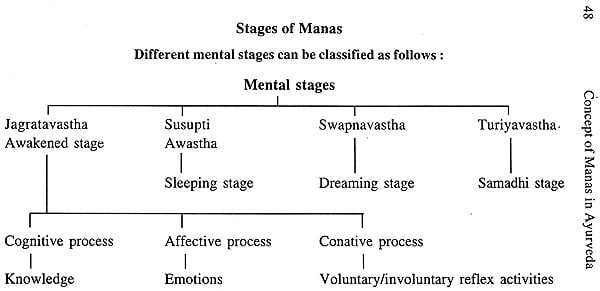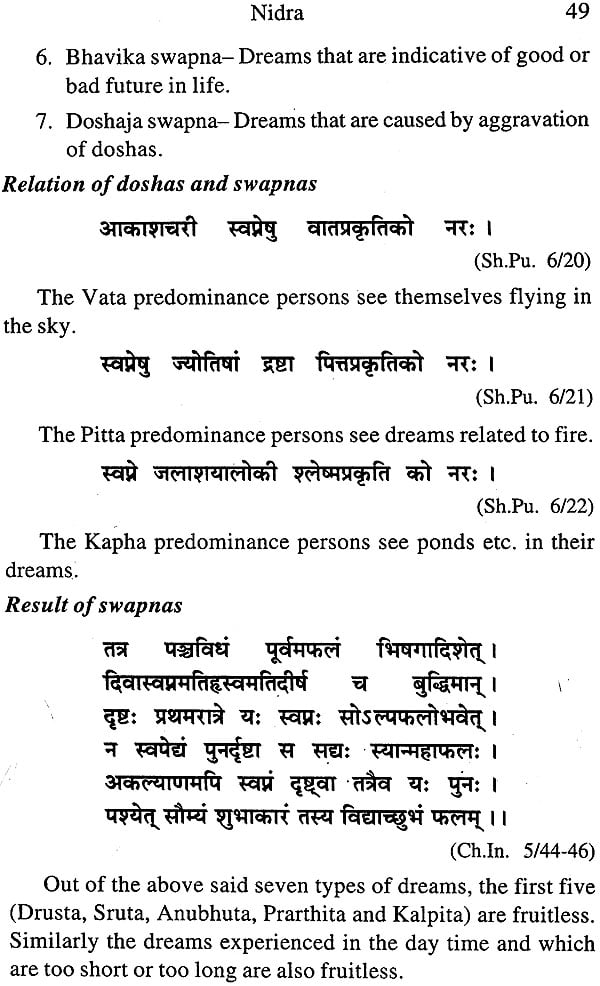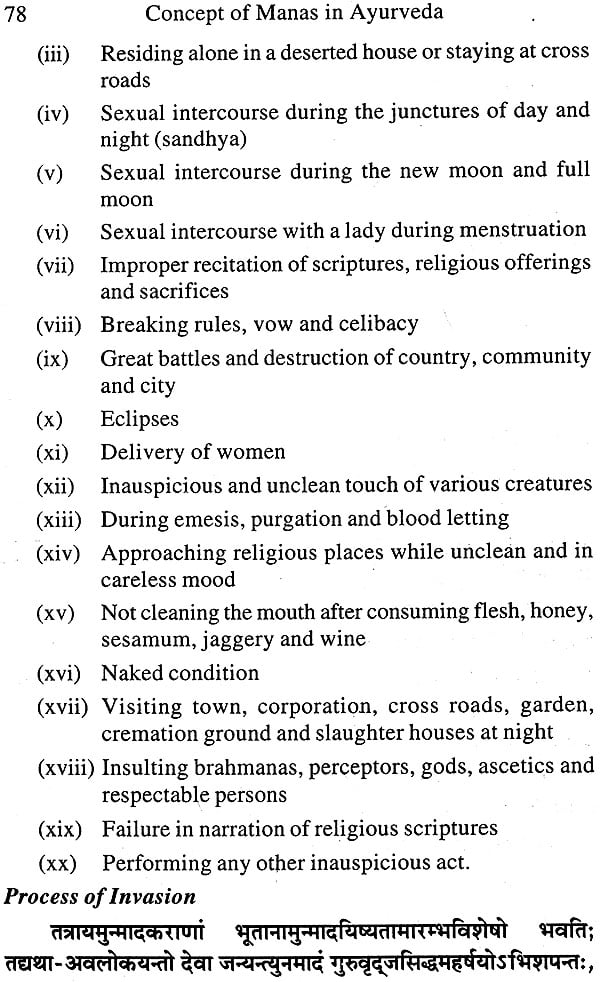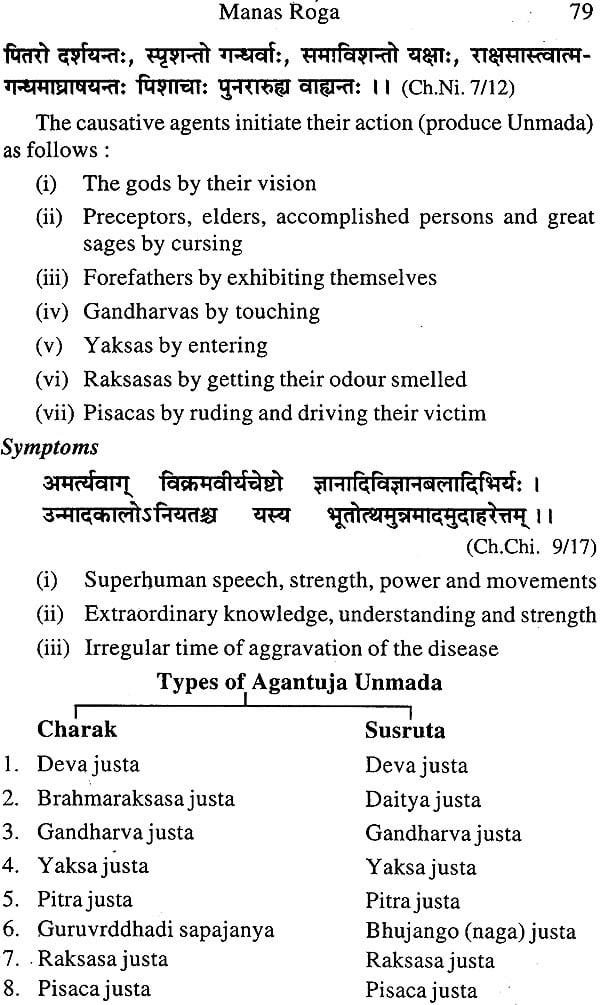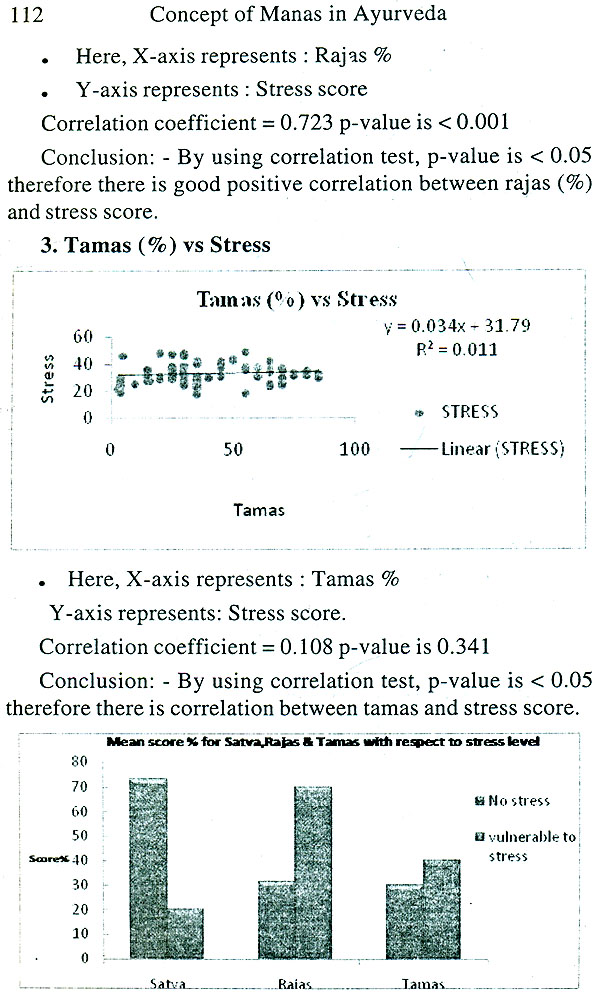
Concept of Manas in Ayurveda
Book Specification
| Item Code: | NAN713 |
| Author: | Dr. Rashi Sharma and Prof. Kavita Indapurkar |
| Publisher: | Chaukhambha Publications |
| Language: | English |
| Edition: | 2016 |
| ISBN: | 9789381608791 |
| Pages: | 135 |
| Cover: | Paperback |
| Other Details | 9.0 inch X 6.0 inch |
| Weight | 140 gm |
Book Description
This book covers almost all possible topics related to manas described in ayurvedic texts and it is especially written keeping in mind the CCIM curriculum for undergraduate and postgraduate scholars of Kriya Sharira. This book is written in very simplified form and is divided into ten chapters and each chapter is unique and well presented. This book will not only help the scholars to explore the concept of manas but also apply it in their clinical practice.
Dr. Rashi Sharma has completed her B.A.M.s. in 2008 from Ayurvedic & Unani Tibbia College, Delhi and M.D. (Kriya Sharir) in 2013 from Bharati Vidyapeeth, College Of Ayurved, Pune. She has secured first rank in Kriya Sharir at post graduate level. She has received Best M.D.Thesis award from 'International Ayurveda Association' and also 'Late Soubhagyavati Laxmibai Thatte Award ' for Best M.D. Thesis in Sharir from All India Sharir Research Institute, Lucknow. At present she is working as an Assistant Professor in Uttaranchal Ayurvedic College, Dehradun. She has published various research articles and presented many research papers in National and International Conferences. She is Editor-in-Chief of the renowned Peer reviewed Journal, U-RAHS i.e International Journal Of Research in Ayurveda and Health Sciences.
Prof. Kavita Indapurkar is Professor in Kriya Sharir at Bharati Vidyapeeth University Pune. She is double gold medalist and has over 20 years of teaching experience at graduate and post graduate level. She is founder and president of Kavita Holistic Healing and Managing Editor of IJ-RAHS (International Journal Of Research In Ayurveda and Health Sciences). She is also the recipient of,"Best Ayurveda Research Guide" from European Ayurveda Academy and "International Ayurveda Samshodhan Bhushan Award' from International Ayurveda Association. She has published many research articles and presented research papers in national and International Conferences in India and abroad.
The term manas prakrati can also be. termed as Sattva Prakrati: Every individual has got his own independent mental status which is curious. It is not anomalous but definitely different from man to man. If one tries to minutely discover each individual's mental status or manas prakrati, it 'Varies from one person to another. Behavior is directly related with a natural mental status right from birth. Every individual's behavior is extremely complicated and complex and also multifaceted. This is because of the completely of the buddhi or brain. It can be studied in variety of ways. It is often a complicated problem for a physician to identify in every 'Individual. The cognitive behavior of every individual has been termed in Ayurveda as manas or Sattva prakrati. Sushruta has categorized these various mental statuses broadly into sat, raj and tarn prakriti. Further all these broad categories or mental personalities have been identified into sixteen categories. Each individual has his own behavioral pattern and thus has got magnanimous social impact because of his varied neuro-behavioral status. While doing general examination of a patient, every clinician is supposed to determine the mental status in appropriate way.
Though in many cases, it takes hours to arrive at final diagnosis and determine individual's manas. In many cases brief examination may provide sufficient information for precise decision concerning an individual's manas prakriti.
After going through the book authored by Dr. Rashi and Prof. Kavita Indapurkar, I personally feel that the scholars of Ayurveda will positively be able not only to manage the patient's mental problem but will also help to meet the Manas problems of a patient on Ayurvedic pattern. Finally I congratulate both the authors of the book for their rich contribution in the field of Ayurveda.
I personally wish to congratulate Prof. Kavita Indapurkar, who is a versatile scholar of Kriya Sharir and recipient of "Honor of Fellowship" from All India Sharir Research Institute, Lucknow for her valuable contribution in the field of Sharir. At the same time also wish to congratulate Dr. Rashi Sharma for her 'immense labour put in writing such an excellent book, she is also one of the recipients of "Best M.D. Thesis Award" by All India Sharir Research Institute Lucknow. I also wish to put in record my appreciation and blessings to both the authors for their herculean efforts in dispensing this gigantic task
I am sure that the book will prove the best seller.
It gives me immense pleasure to write ... , the foreword for the book entitled, "Concept of Manas in Ayurveda" by Dr. Rashi Sharma and Prof. Kavita Indapurkar. Very few books are available on this extremely important subject of manas.
The work of Dr. Rashi Sharma and Prof. Kavita Indapurkar is appreciable as they not only compiled the original concepts of samhitas but also tried to interpret the subject for better understanding I appreciate their understanding of the subject and efforts to bring it in the form of a book.
Both the authors deserve congratulations I hope and wish that they will continue such efforts to serve the Ayurveda with same spirit. The book is very useful for teachers, students, practitioners and researchers and a great boon to the society. I wish them success in future and life.
Contents
| Chapter 1 | Introduction | 1-2 |
| Chapter 2 | Manas | 3-9 |
| Etymology | 3 | |
| Definition | 3 | |
| Synonyms | 3 | |
| Location | 4 | |
| Swaroopa | 5 | |
| Characteristics | 5 | |
| Manogunsas | 6 | |
| Manovishayas | 6 | |
| Action | 7 | |
| Signification | 7 | |
| Chapter 3 | Manas Prakruti | 10-27 |
| Introduction | 10 | |
| Types | 10 | |
| Interrelation of Sharir and Manas Prakruti | 17 | |
| Manas prakruti and state of health | 23 | |
| Practical utility of manas prakruti | 26 | |
| Chapter 4 | Emotion | 28-33 |
| Definition | 28 | |
| Classification | 29 | |
| Treatment | 31 | |
| Chapter 5 | Atma | 34-37 |
| Etymology | 34 | |
| Swaroopa | 34 | |
| Sadhan | 34 | |
| Types | 34 | |
| Characteristic features | 36 | |
| Process of gaining knowlege | 37 | |
| Chapter 6 | Nidra | 38-50 |
| Introduction | 38 | |
| Definition | 38 | |
| Nidrotpatti | 39 | |
| Characteristics | 39 | |
| Characteristics | 39 | |
| Types | 39 | |
| Physiological and clinical significance | 42 | |
| Time of Nidra | 43 | |
| Recommendation for day sleep | 43 | |
| Nidranash | 44 | |
| Etiological factors | 44 | |
| Treatment | 44 | |
| Tandra | 45 | |
| Introduction | 45 | |
| Definition | 45 | |
| Pathogenesis | 45 | |
| Symptoms | 46 | |
| Treatments | 46 | |
| Swapna | 46 | |
| Introduction | 46 | |
| Definition | 46 | |
| Process of manifestation | 47 | |
| Types | 47 | |
| Stages of Manas | 48 | |
| Relation of Doshas and swapnas | 49 | |
| Results of Swapna | 49 | |
| Chapter 7 | Applied aspect of Mans | 51-57 |
| Introduction | 51 | |
| Psychological causes of some diseases | 51 | |
| Psychological consideration in diagnosis | 54 | |
| Sattwa Pariksha | 54 | |
| Psychological consideration in treatment | 55 | |
| Psychological concept of personality and constitution | 56 | |
| Chapter 8 | Manas Roga | 58-103 |
| Definition | 58 | |
| Nidana (Etiological factors) | 58 | |
| Classification | 58 | |
| Lakshana (signs and symptoms) | 60 | |
| Manah pariksha | 61 | |
| Chikitsa | 63 | |
| Common manas roga | 68 | |
| Unmada | 68 | |
| Apasmara | 92 | |
| Atattvabhinivesa | 100 | |
| Chapter 9 | Relation of diet with manas | 104-106 |
| Chapter 10 | Recent researches on manas | 107-123 |
